From Just One Woman to 39 Percent of the Class—and Other Ways LBS Has Changed Over the Past 50 Years

The 2017-18 academic year marks the 50th anniversary of the MBA program at London Business School (LBS). Since 1968, the school has offered a two-year Master of Science (MSc) in Business Studies degree program—the original MBA—and has continuously refined its offerings since that time. In celebration of the 50-year mark, LBS is looking back at how far the program has come.
The Beginning
In 1966, two years after London Business School opened its doors, the school launched a two-year Master of Science (MSc) in Business Studies. The first class consisted of 35 men and just one woman, with the average age around 25 years old. The goal of the two-year degree was to prepare students for employment. In fact, according to the website, employment was seen as “one of the most significant aspects of the school’s progress at this stage of its development.”
After graduation, most students joined manufacturing firms, and a few went into merchant banking, management consultancy, and advertising. Their job functions included marketing and financial executives, planning personnel, and personal assistant roles.
As for the feedback on the first year of study, a report on the class stated, “The overall academic performance of the students during the year has been more than satisfactory. The course of studies is arduous and the number of hours of work required is much above average, imposing a considerable workload both on students and staff.”
The Early Years
In the early years of the program, growth was slow but steady. In 1971, the class size grew to 86 students and by 1975, 108 students were admitted, including 16 women. Throughout this time, LBS made various modifications to its program.
- In 1973, LBS introduced the International Management Program, which gave 10 students the change to study abroad in Paris or at New York University.
- In 1978, the International Management Program expanded to include Harvard, Stanford, Wharton, Chicago, and top European institutions.
The 1980s
The 1980s were a time of change for LBS and the MBA program. During these years, banking and finance overtook manufacturing as the top industry for graduates. In addition, LBS continued to increase its international reputation; about half of its class comprised non-British students by the end of the decade, with more 30 nationalities represented. Most importantly, the Class of 1987 was the first to be awarded an MBA rather than an MSc degree. In an annual report, the school stated, “This more accurately and effectively conveys the spirit of the program, and the type of qualifications our students are aiming for.”
- In 1982, LBS introduced a new part-time master’s program. The first class accepted 60 people and allowed students to complete their studies over two and a half to three years while still working.
- In 1984, three more U.S. schools joined the International Exchange Program including Dartmouth Tuck, MIT Sloan, and Northwestern Kellogg.
The 1990s
In the 1990s, LBS adopted a more flexible format for its MBA program. The school added increased training in “soft skills” and introduced computer-based management simulation games. The class size also increased to 271 students, with 79 percent of students coming from outside the United Kingdom. Consulting became the top choice for graduates, and manufacturing shrunk to just 11 percent.
- In 1992, LBS introduced a language requirement where students must be fluent in English and one other language to graduate. In addition, the part-time master’s was re-launched as the Executive MBA.
- By 1996, entrepreneurship became an important part of the program, and the school launched several electives with an entrepreneurial focus, including “Small Business Management” and “Financing the Entrepreneurial Business.”
- 1999 was the first Financial Times Global MBA ranking, and LBS ranked #1 in Europe and #8 in the world—the only non-U.S. school in the top 10.
The 2000s
By the 2000s, LBS had become a global leader in MBA education—and in 2009 it became the first non-U.S. school to top the Financial Times ranking. The MBA program was reformatted for increased flexibility, allowing students to graduate in 15 to 21 months. The class size also increased to 315 students, with 89 percent of the class from 59 countries outside the United Kingdom.
- In 2001, LBS ranked as the best Global MBA by the Financial Times, and Forbes ranked LBS as #1 in Europe and #2 in the world for return on investment.
- In 2003, LBS became the first European school to join the Forté Foundation to increase women in business, and in 2005, women made up 22 percent of the class.
The 2010s
In the last decade, London Business School once again revised its MBA program to give students even greater flexibility. The school also continued to increase its size, welcoming 468 students by 2018—12 times the size of the first class in 1968. In addition, women now make up 39 percent of the MBA class, and students represent 77 different nationalities.
- In 2010, LBS started its Incubator Program to help entrepreneurs. As of 2017, 58 businesses have completed the incubator, raising more than £31 million and creating 440 full-time jobs.
- In 2012, LBS launched the Global Business Exchange (GBE), giving students the opportunity to spend a week in another country with options ranging from South Africa to the United States.
- In 2016, LBS completed its first fundraising campaign, raising £125 million.
To learn more about the 50th anniversary celebration of London Business School’s MBA, visit the school website.
This article has been edited and republished with permissions from our sister site, Clear Admit.
Facebook Tops Glassdoor’s 100 Best Places to Work List

Employer review website Glassdoor, which allows users to read anonymous employee testimonials about employers, has revealed its annual “Best Places to Work” list, with familiar MBA recruiters Facebook, Bain & Co, and Boston Consulting Group (BCG) earning the top three spots.
Why Facebook?
Since 2011, the social media empire has been one of Glassdoor’s most praised companies to work for, earning a top five spot seven out of the past eight years, including three number one overall awards. Facebook employees are often given extensive benefits, including four months of paid maternity leave—a policy often considered a luxury in the U.S., which has no legally mandated paternity leave policies for employers. As well, earlier this year, Facebook COO Sheryl Sandberg announced the company would implement paid sick time for employees and family members.
With increasing revenue streams, the company’s hiring numbers have continued to swell, with nearly 19,000 employees as of earlier this year—a 38 percent jump from March 2016 to March 2017. In fact, just this week, the company announced it will be adding 800 more jobs at its new London office.
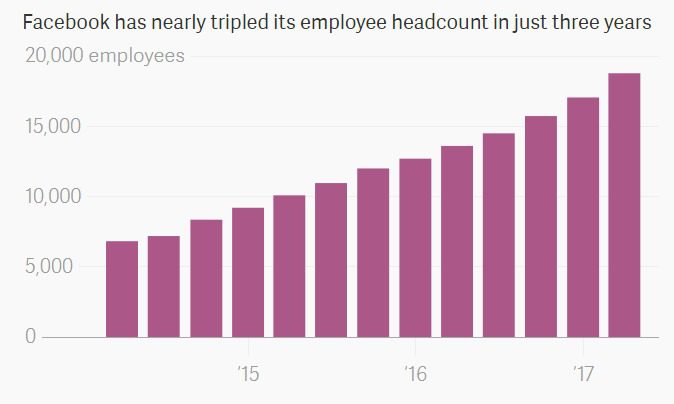
Data via Facebook, graphic by The Atlas/via Quartz.
Of course, the central pitch to work at the social media monolith may be predicated on the payment of employees. According to Paysa, the average Facebook salary is north of $250,000 annually, combining base pay, bonuses, and equity. Most jobs at the company start at, at least, $70,000 USD annually, with business management roles starting at $135,000.
The company has also made a concerted effort at diversifying its hiring. Speaking with Forbes, Lori Goler, vice president of people, said, “Diversity is critical to our mission at Facebook, because we serve a community of 2 billion around the world, and of course there’s diversity in that community.”
The company, according to Forbes, employs between 33 and 35 percent women, and there has been considerable gains among women employed with computer science and engineering backgrounds, as well as a 500 percent increase in employment among those of African descent since 2014. In the interview, Goler added, “We’re nowhere near where we want to be, but we’re at least hearted to see that at least we can make some progress.”
Check out Facebook’s graduate student recruitment page here.
Consulting Companies Still Reign
While certain statistics indicate a wave of MBA grads may be leaving consulting in favor of tech-centric employers, as evident by the recently released Northwestern University Kellogg School of Management employment report, consulting companies are remain one of the primary targets for MBA students and graduates, and for good reason.
Bain & Co., like Facebook, has been endlessly praised by Glassdoor reviews, ranking among the top four best places to work every year since 2009. Like most of the companies on the year-end list, Bain offers ample benefits, including several months of paid maternity leave, comprehensive vacation and insurance policies, and one of the world’s best 401K offers. Fellow Boston metro company BCG also officers a considerable parental leave benefits package, retirement planning, and lofty salaries.
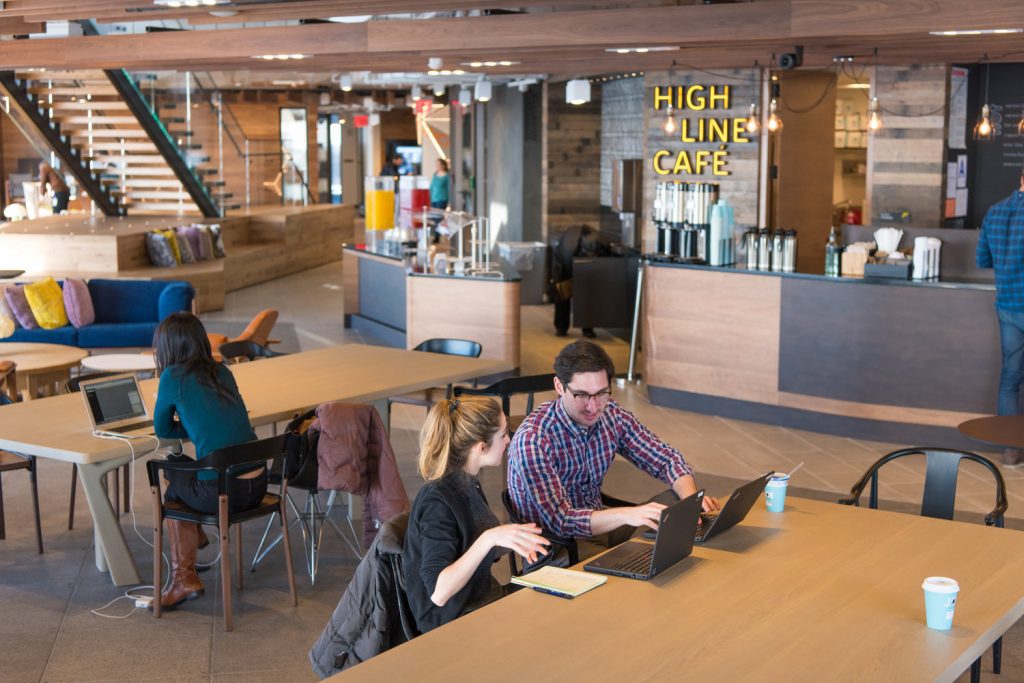
Inside the New York City BCG office/Photo via BCG.
Like Bain, BCG makes a concerted effort to bring in incredibly comparable MBA graduates, recruiting students from multiple prominent business schools like The Wharton School, NYU Stern, Columbia Business School, and many more.
Some Traditional Companies Remain Steady, While Giants Like Apple Stumble
Tech empire Google, not surprisingly, held its place among the top 10 companies—having never fallen lower than eighth overall since 2012. Just outside of the top ranking companies, McKinsey & Co. stayed within the top 20, while other notable heavyweights like Microsoft (39th), Capital One (69th), Deloitte (77th), Accenture (83rd), and Apple (84th), the world’s most successful consumer company, fell to the lower ends of the list.
Despite having the second most profitable year in company history, falling shortly behind it’s 2015 figures, Apple has been steadily dropping down Glassdoor’s annual Best Of list, posting its worst standing in the history of the ranking—nearly 50 spots worse than last year’s ranking of 36th overall.
Considering, however, that the annual ranking is comprises of over 500,000 companies, this drop may not be as serious as it would appear. The overall Glassdoor rating for Apple was 4.3, in contrast to Facebook, which boasts a current 4.6 rating. The average Glassdoor rating for employers, for context, is 3.3.
Some Surprises
Not every company included in the Glassdoor Best Of list could be considered a traditional MBA recruiters, including beloved U.S. west coast fast food chain In-N-Out Burger (fourth overall), growing athletic leisurewear empire Lululemon (sixth), wine company E. & J. Gallo Winery(14th), Delta Airlines (17th), and The Church of Jesus Christ of Latter-day Saints (19th), which provides “Excellent dental and medical coverage,” according to an anonymous employee. Plus, “you work with people who don’t swear.”
For a more extensive overview of the methodology behind the ranking, click here.
MBA and Innovation: Our 4 Favorite Denver Schools for Entrepreneurs

Colorado’s population and economy have been rapidly expanding in recent years. The Denver Post estimates that, by 2050, Colorado’s population could increase to 8.5 million people: a 64 percent increase from the current population of 5.5. The economic and population boom make Denver an ideal place to launch a business. Denver is also less than an hour from Boulder, a city Inc. Magazine refers to as “America’s Startup Capital.” All in all, Denver metro is starting to look like a no-brainer for budding entrepreneurs.
But turning an idea into a company involves making infinite difficult decisions about business issues and strategy. According to Forbes, 90 percent of start ups eventually fail. Earning an MBA means gaining access to business networks, knowledge, and resources, and it can be an excellent way to gain the edge you need in order to help your idea thrive. Below, we’ve laid out four of our favorite Denver MBA programs for entrepreneurs.
University of Denver – Daniels College of Business
Students who want to start a business would be remiss not to consider the University of Denver’s Daniels College of Business, which was recently listed among Inc. Magazine’s “15 Most Innovative MBA Programs.” Forbes also ranked University of Denver in the “Top 50 for Startups” as recently as 2014. Daniels grads have gone on to start their own companies, and to find creative ways to meet the needs of their community. Leo Osahor (MBA 2007, MSM 2007) developed FlightSpeak, the largest and most detailed airport app to date. The app allows travelers to view security wait times, shopping options and coupon offers, and WIFI info for 315 airports around the world. The school also helps sponsor an annual Pitch Competition that fosters entrepreneurship by allowing graduate and undergraduate students to present their company or product ideas to a panel of local business owners. Winners receive a $1,000 cash prize that lets them take steps toward bringing their ideas to fruition.
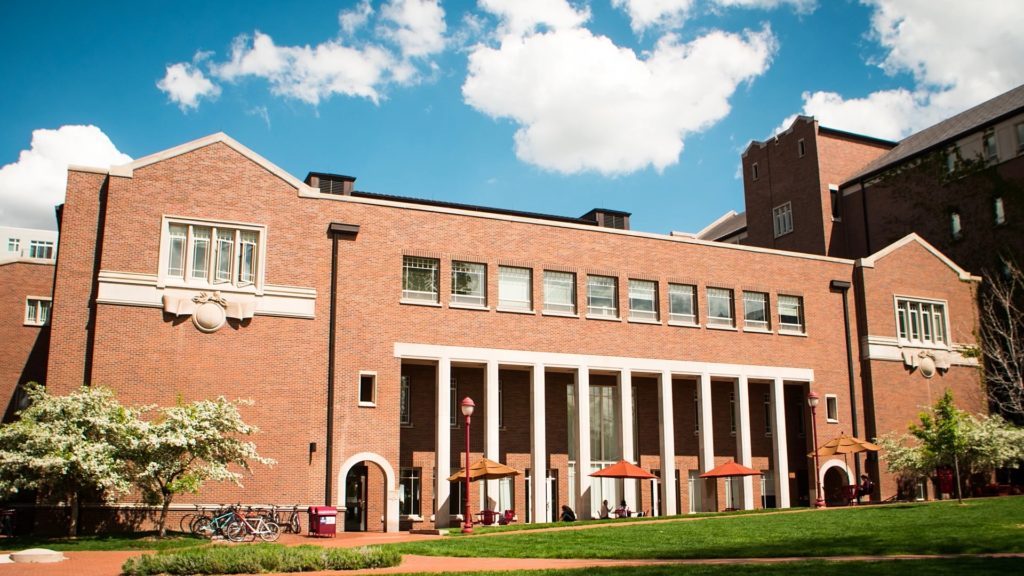
The Daniels College of Business/Photo via Daniels.edu
Colorado State University College of Business
The Colorado State University College of Business has an entire institute devoted to entrepreneurship. The Institute for Entrepreneurship offers several programs outside of the classroom that help budding entrepreneurs gain the insight and resources they need to embark on their business ventures. According to the school, the institute hosts annual events such as Women Entrepreneurs’ Leadership Summit, Venture Adventure Challenge, and the Distinguished Entrepreneur speaker series.
University of Colorado – Denver Business School
The University of Colorado’s Denver Business School MBA program provides the option of pursuing an entrepreneurship specialization. This specialization allows students to explore a breadth of topics including web development, personal branding, and social entrepreneurship. MBAs with this specialization devote 12 of their 15 elective credits to entrepreneurship-related courses. University of Colorado’s Jake Jabs Center for Entrepreneurship supplies students aiming to start their own business with additional resources, such as career coaching, networking, job recruitment, and internship opportunities.
University of Colorado, Boulder – Leeds School of Business
Students at the University of Colorado, Boulder’s Leeds School of Business will have no trouble accruing the knowledge and skills necessary to start their own business. Leeds students can pursue an MBA with an entrepreneurship focus. In fact, the school offers so many entrepreneurship electives, there are six sub-categories students can use to tailor their educational trajectory to their specific goals. Entrepreneurship MBAs can focus on New Venture Finance, Entrepreneurial Marketing, Entrepreneurial Practice, Sustainable and Social Entrepreneurship, Corporate Entrepreneurship, or New Venture Creation. Leeds School of Business has inspired innovators such as Brent Handler, the destination club pioneer who co-founded Exclusive Resorts.
What Are The Highest Paid MBA Salaries in San Diego?
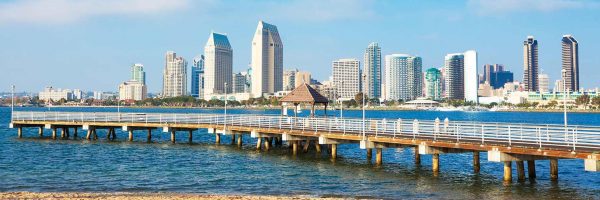
If you’re looking to take in the California sun but avoid the fast-paced and high-priced centers of Silicon Valley or Los Angeles, heading southward to San Diego may be the perfect place for an up-and-coming business professional. Recently named the eighth best big city to live in the U.S., based on livability, education, health, and a strong local economy, San Diego is increasingly becoming the perfect spot for business students looking to advance their education and start a career. Not only is San Diego the perfect spot for those breaking into well-established fields within business, but it has also been ranked by Forbes as the best city to start a new business in the U.S. Demonstrating heavy concentrations in areas that predict high growth combined with adaptability to new business methods and tech make San Diego the perfect place for young entrepreneurs to put their education to work.
Of course, a city can really only top the list for business students if it can offer quality educations and high-value degrees. In a state with a notoriously high cost of living, students thinking about pursuing a degree in San Diego will want to be sure their investment is worth it.
Thankfully, San Diego offers a number of quality business schools with graduates that are able to quickly turn their degree into a high salary and promising career. Let’s take a closer look at the business schools with the highest post-graduate salaries for MBAs in San Diego.
Rady School of Management – UC San Diego
According to the Rady School of Management at UC San Diego Class of 2017 Employment Report for full-time MBA graduates, the overall salary average for MBA students was $84,335, with a majority of graduates finding jobs in San Diego’s ever-emerging technology industry. Tech-based companies actively hiring recent Rady MBAs include Amazon, HP, IBM, and San Diego’s own Qualcomm Technologies, Inc, among others.
Not only are the post-MBA salaries high for Rady graduates, but so is the likelihood that graduates will secure a job. About 82 percent of graduates had secured a job within just three months of graduating, and 10 percent started their very own company—reflective of San Diego’s entrepreneurial environment.
University of San Diego School of Business Administration
The average salary for graduates from The University of San Diego School of Business Administration is $72,363, with a true range of salaries anywhere from $50,000 to $100,000 per year. Within just three months after graduation from the School of Business, 83 percent of MBA students would find employment, covering a wide range of industries from technology (40 percent) to consulting (20 percent) and consumer products (20 percent). Top companies such as Amazon, Deloitte, Intel, and Hewlett Packard have hired USD MBA graduates.
Fowler College of Business Administration – SDSU
The Fowler College of Business at San Diego State University also boasts some of the highest MBA salaries in San Diego. More than two-thirds of graduates from the full-time MBA program at Fowler would find jobs or promotions within three months after earning their MBA, with an average salary of $61,467. Graduates were spread through a number of industries and professional functions, the most significant percentage working in business development/sales and within the Technology/IT/Information Systems fields. Following graduation, Fowler students found jobs with some of the country’s top brands, such as The Gap Inc., GEICO, HSBC Group, and PepsiCo Inc.
For prospective MBA students looking to get paid out west, you can check out our overview of the highest paid MBA salaries in Los Angeles and San Francisco as well.
Merage School of Business MBA Earns Praise From The Economist
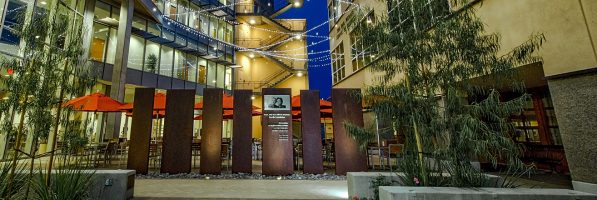
The UC Irvine’s Merage School of Business received some good news after the school was ranked in latest business school rankings of The Economist. The school placed 39th in the nation, 16th among public schools, and 56th in the world. The Los Angeles metro business school also scored well in categories including 29th in Open New Career Opportunities; 17th in alumnus rating of career services; and 13th in salary increase.
Continue reading…
Getting To Know The Denver Metro

Resting beside the scoping silhouette of the Rocky Mountains lies Denver, the 19th most populous metro area in the United States, and arguably its most serene, uniquely blending urbanization and naturalism.
As the Denver metro continues to expand and its economy continues to swell, we at MetroMBA are expanding as well. As we continue our coverage of the best MBA offerings in North America and the UK, we welcome our readers to take a look at the best business schools Denver has to offer.
Getting To Know The Denver Metro
If you haven’t heard already, Denver—The Mile High City—rests one mile [5,280 feet (1,609 meters)] above sea level. For those already familiar with the joyous overture of altitude sickness (bring a water bottle—everywhere), this not-so-fun-fact is only a small part of Denver’s academic environment. Located only several minutes south of center city Denver is the Daniels College of Business at the University of Denver. Founded in 1908, Daniels is among the eight oldest business schools in the United States, and features over 2,200 combined graduate and undergraduate students. Named after Bill Daniels, who donated an immense grant to the institution, the school officially changed its name from the College of Business Administration to the Daniels College of Business in 1994.
The school is routinely lauded by the likes of U.S. News, Forbes, and the Financial Times for its highly-recommended entrepreneurial and Executive MBA programs, as well as the MBA@Denver Online MBA. For the 2017-18 academic year, the Daniels full-time MBA (known as the Denver MBA), will cost students $69,391. This is just shy of the average Daniels MBA graduate average starting salary of $69,842. About 68 percent of Daniels’ graduates earn a full-time job just three months after graduation.
Located right in the middle of center city Denver is the Colorado University Denver Business School, which features five different MBA program offerings, including: a full-time Professional MBA; an 11-month accelerated MBA; the CU Denver Business School Executive MBA; the Health Administration MBA; and the highly-ranked Executive MBA Program in Health Administration, which is regarded by U.S. News as one of the 25 best “graduate programs in health services administration.” The UC Denver Business School, which was originally part of CU Boulder, has a second location 20 miles south of its center city location at the Liniger Building, formally part of CU South Denver.
Its original home, the University of Colorado Boulder, houses the most highly-regarded business institution in the state: the Leeds School of Business. Ranked among the best business schools in the country by both U.S. News and Forbes, Leeds is located less than 30 miles northwest of center city Denver. It offers both an exceptional full-time and Evening MBA, enrolling around 300 total students in both programs.
The accredited business school is, in fact, two years older than the aforementioned Daniels College of Business, making it the oldest business school in the state. Leeds holds a staggering 97 percent graduation rate for MBA students, who earn an average of $80,123 upon receiving full-time employment. MBA students that graduate from Leeds have been recently employed by notable companies like Deloitte, McKinsey & Co., Microsoft, Oracle, and more.
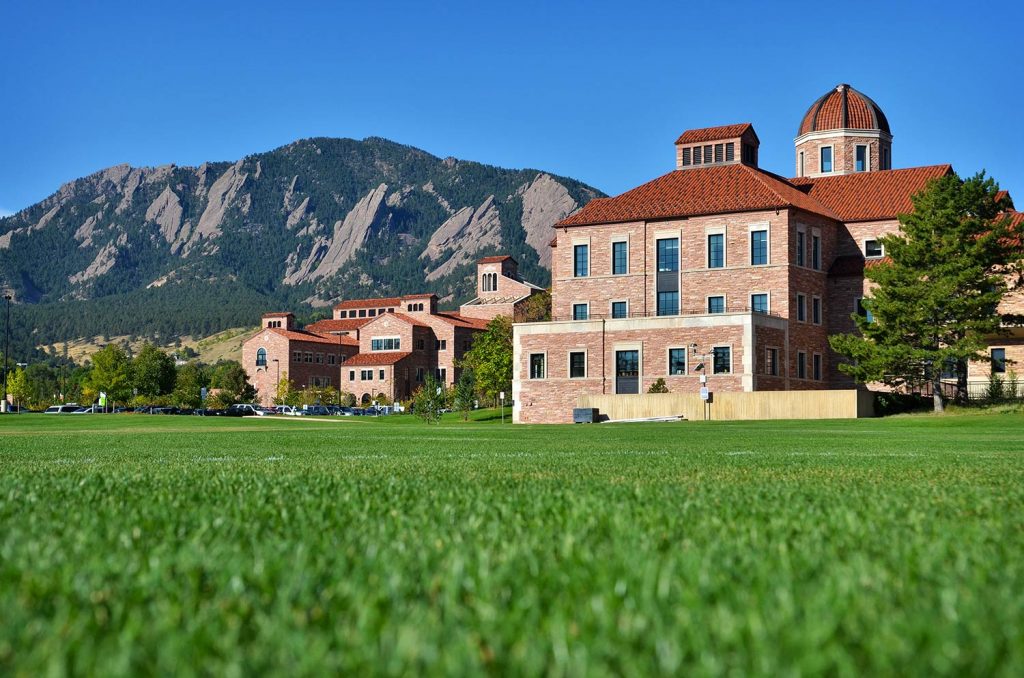
The Leeds School of Business at CU Boulder
Travel about an hour north of Denver and you’ll find the Colorado State University College of Business, located in Fort Collins. The CSU College of Business, located on the north end of the CSU campus, hosts a myriad of well-rounded MBA programs, including the universally well-regarded Online MBA—ranked among the 20 best in the world by the Financial Times. The MBA program is also one of the most affordable in the state, with current full-time tuition coming at a total cost of $40,368, and $40,897 for part-time students.

Colorado State University
The Denver Metro Business Community
After the federal and state government, both the first and second largest employers in the state, Denver is home to several of the country’s largest healthcare institutions, including American Medical Response and DaVita, as well as large employment branches for companies like Kaiser Permanente. The metro area is also home to the famous Coors Brewing Company, as well as more than 160 other brewing companies, which helped the city earn the nickname “The Napa Valley of Beer.” In addition, Denver is the original home of Western Union, Frontier Airlines, and multiple fast food chains, including Chipotle, QDoba Mexican Grill, and Quizno’s. According to the U.S. Bureau of Labor Statistics, the city has also seen employment figure increases in almost all industries.
Explore MBA programs in the Denver metro, subscribe to our informative weekly newsletter, and follow us on Facebook.
